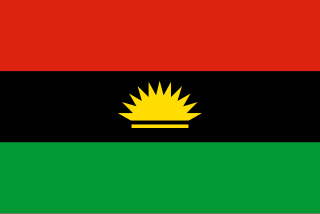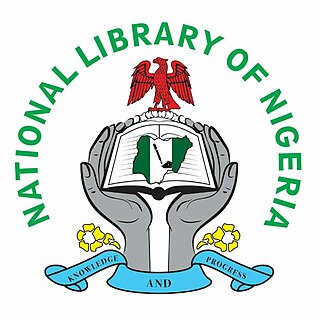
The Catholic Church in Nigeria is part of the worldwide Catholic Church, under the spiritual leadership of the Pope, the curia in Rome, and the Catholic Bishops' Conference of Nigeria (CBCN).

Nigerian Breweries Plc, is the largest brewing company in Nigeria. It serves the Nigerian market and West Africa.

The 1999 FIFA World Youth Championship took place in Nigeria between 3 and 24 April 1999. This was the 12th edition of the tournament.

The flag of Biafra, used by the Republic of Biafra during the Nigerian Civil War (1967–1970), consists of a horizontal tricolour of red, black, and green, charged with a golden rising sun over a golden bar. The eleven rays of the sun represent the eleven former provinces of Biafra. The rays are typically long and slender with the lowest rays being nearly horizontal and the remaining rays spread evenly between.
Francis Abiola Irele was a Nigerian academic best known as the doyen of Africanist literary scholars worldwide. He was Provost at Kwara State University, founded in 2009 in Ilorin, Nigeria. Before moving back to Nigeria, Irele was visiting professor of African and African American Studies and of Romance Languages and Literatures at Harvard University.

Area boys are loosely organized gangs of street children, teenagers and youths, composed mostly of males, who operate on the streets of major cities in Nigeria, including Lagos, Ibadan, Onitsha, Aba, Umuahia, Akure, Ado-Ekiti and Enugu. They extort money from passers-by, public transporters and traders, sell illegal drugs, act as informal security guards, and perform other "odd jobs" in return for compensation.

Kenneth Onwuka Dike was a Nigerian educationist, historian and the first Nigerian Vice-Chancellor of the nation's premier college, the University of Ibadan.

The National Library of Nigeria came into operation in the mid-1960s with the enactment of the National Library Act of 1964 which was later replaced by Act No. 29 of 1970. Before the passage of the National Library Act, a series of educational conferences conducted in Ibadan served as the intellectual basis for the creation of a network of libraries funded by the federal government to provide accessibility of educational materials to Nigerians. A government advisory committee was later created concerning the necessity to develop a local repository of knowledge. The committee was charged with finding a way to aid the government in bringing to prominence the intellectual foundations of its policies, creating a national bibliographic center, and providing an arena for the promotion of knowledge. The committee was the first major formal body that called for a National Library as part of its recommendations. The government accepted the demands of the advisory committee and undertook the necessary steps to build a National Library.
The Federal Radio Corporation of Nigeria (FRCN) is a Nigerian state radio broadcasting organization. Its flagship station is the syndicated radio network Radio Nigeria, with FM stations across the 36 states and Zonal station in the 6 geopolitical zones that broadcast in the SW. According to FRCN, it is the largest broadcasting organization in Africa.

Railway stations in Nigeria include:

Responsibility of water supply in Nigeria is shared between three (3) levels of government – federal, state and local. The federal government is in charge of water resources management; state governments have the primary responsibility for urban water supply; and local governments together with communities are responsible for rural water supply. The responsibility for sanitation is not clearly defined.
The following is a timeline of the history of the city of Ibadan, Oyo State, Nigeria.
Lloyd Chike Gwam was a Nigerian historian and Director of the Nigerian National Archives in Ibadan.
Philip Aigbona Igbafe was a Nigerian historian, professor and public administrator noted for his work on the history of the Edo people of the precolonial Kingdom of Benin. He belonged to the Ibadan History School and his major works examine the motives for colonialism and highlight the political, social and economic consequences of British rule for the African kingdom.

Kenneth Dike Library was founded in 1948 as part of the University of Ibadan academic community. It has over two million academic materials such as books, theses and journals.
LaRay Denzer is an American historian and academic who has written extensively on African women, in particular the role of women during the colonial period and during an era of military dictatorships.
The 1979 Kaduna State gubernatorial election occurred on July 28, 1979. PRP's Abdulkadir Balarabe Musa won election for a first term to become Kaduna State's first executive governor leading by 45.14%, defeating NPN's Lawal Kaita who got 44.42% and the GNPP candidate with 10.44%, in the contest.
The Historical Society of Nigeria (HSN) is the oldest professional association of historians in Nigeria. It was founded at University College Ibadan, in 1955. Kenneth O. Dike and Abdullahi Smith were the founders.












